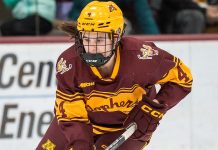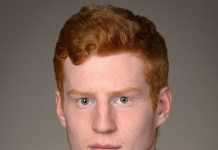The battle is far from over, but the University of North Dakota has won a small victory against the NCAA in its effort to retain the Fighting Sioux nickname and logo used by the university’s athletic teams.
The NCAA put off until April 27 the enforcement of its policy penalizing UND and 12 other college teams that use American Indian nicknames, imagery and mascots that the association deems “hostile and abusive.”
Last Monday, the NCAA Executive Committee was to decide on UND’s second and final appeal. However, five days before that meeting, the university received a letter from Bernard Franklin, NCAA senior vice president for governance and membership, saying that more time was needed to study and respond to additional information submitted by UND.
Phil Harmeson, senior associate to UND president Charles Kupchella, said that for all practical purposes, the university is free to use the Sioux nickname and logo through the end of the current school year. Even if the NCAA Executive Committee denies UND’s final appeal in April, the school wouldn’t have time to change its uniforms, he said.
This means that if UND’s Division I hockey team plays in any NCAA playoff events this spring, players can wear their standard uniforms. Had the policy gone into effect Feb. 1 as planned, the NCAA would have required UND’s athletic teams to cover the Sioux name and logo on their uniforms.
UND hosts the NCAA West Regional hockey tournament at Ralph Engelstad Arena in Grand Forks March 24-25. In September, the NCAA dropped a requirement that the university cover thousands of Sioux logos and references in the arena during the event after UND said the association was attempting to unilaterally change an existing contract.
The delay is also good news for UND’s Division II women’s basketball team, which is currently undefeated and ranked second in the nation. Had the NCAA’s policy gone into effect next month, UND would have been prohibited from hosting any basketball playoff games, even if its team had earned home-court advantage.
Harmeson said the NCAA backed off on implementing the policy because of UND’s response to a Dec. 9 NCAA staff committee review of the university’s second appeal, which had been filed in November. The staff committee recommended that UND’s final appeal be denied by the NCAA Executive Committee.
In a 35-page document sent to the association on Dec. 23, UND laid out its legal case against the NCAA. It cited case law supporting UND’s right to use the nickname and logo, harshly criticized research and presumptions used by the NCAA, and questioned the authority of the NCAA Executive Committee to enact “legislation disguised as ‘policy'” without a full vote of the membership.
UND claims that the NCAA has breached its contract with the university and, by doing so, could be in violation of federal antitrust laws. Harmeson, who holds a law degree and signed the response, said the intent was to give the NCAA a clear indication of how UND would proceed in court if its appeal was denied.
The NCAA has issued a revised schedule for UND’s appeal. The association’s staff review committee will send UND another response by Jan. 18. UND will have until Feb. 1 to issue a rebuttal to that response. On April 27, the NCAA Division II Presidents Council will review all the information and make a recommendation to the NCAA Executive Committee, which meets later the same day. The Executive Committee will then rule on UND’s final appeal.
In the meantime, Harmeson said tribal council members from the Standing Rock Sioux Reservation and the Spirit Lake Nation in North Dakota have visited UND and held discussions with Kupchella and other university officials. They toured Engelstad Arena, and some attended a hockey game last month between UND and Minnesota.
“Tribal leaders have visited UND recently, and we had a great dialogue with them about the university, our American Indian programs and the nickname issue,” Harmeson said. “It’s fair to say that some of them came away from UND after their first visit very impressed.”
Last Aug. 5 when the NCAA Executive Committee announced its policy, there were 18 schools it said were using “hostile and abusive” nicknames, mascots or imagery. UND and the other 17 schools were allowed to appeal the NCAA ruling if they desired.
Three universities — Florida State (Seminoles), Central Michigan (Chippewas) and Utah (Utes) — won their appeals when the NCAA ruled that each had permission from a namesake tribe in their respective states to use tribal names. Two other universities — Carthage (Redmen) and Midwestern State (Indians) — have agreed to drop nicknames with Native American references.
UND, Bradley University (Braves), Indiana University (Indians) and Newberry College (Indians) have had their appeals denied. The University of Illinois, which also appealed, was told that it could retain its Fighting Illini nickname, but must change its logo and stop using its Chief Illiniwek mascot.
This past fall when UND’s football, women’s soccer and cross-country teams made the NCAA playoffs, the association quietly postponed until Feb. 1 the enforcement of its policy against uniforms displaying American Indian names or logos. That part of the policy went into effect last August, but UND contended that its appeal was still pending and that it didn’t have time to order replacement uniforms for the playoffs.


